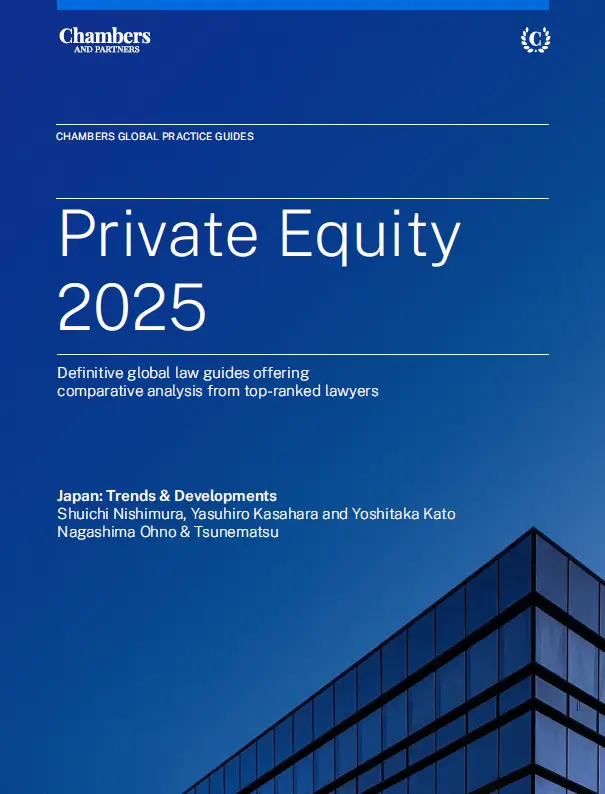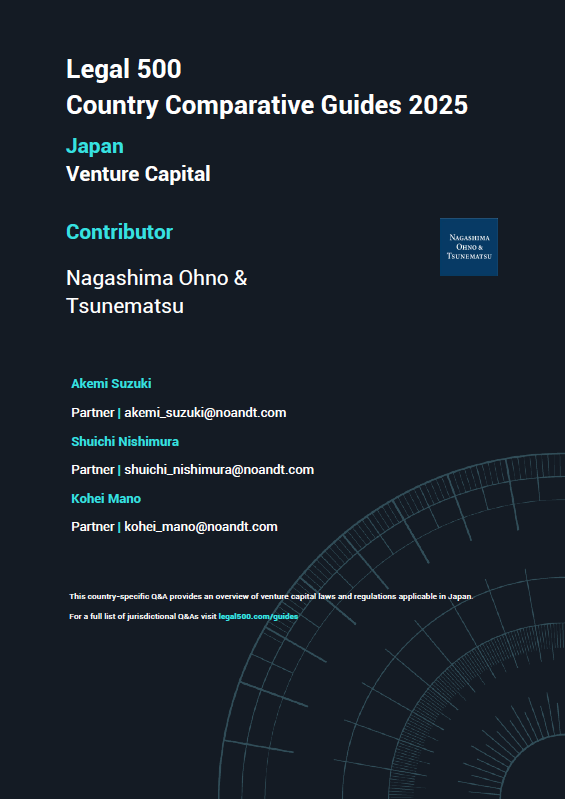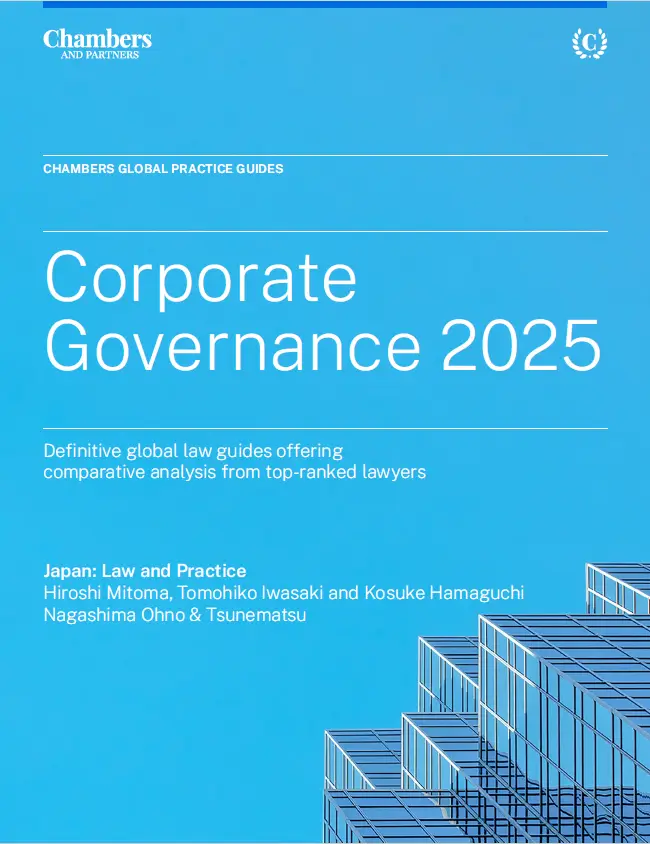
Articles
Lexology Panoramic Next – Private Equity 2025 Japan
(September 2025)
Yasuhiro Kasahara, Masaki Mizukoshi, Yoshitaka Kato (Co-author)
- M&A
- Mergers & Acquisitions
- Private Equity/Venture Capital and Startups
Publication

Newsletters
*Please note that this newsletter is for informational purposes only and does not constitute legal advice. In addition, it is based on information as of its date of publication and does not reflect information after such date. In particular, please also note that preliminary reports in this newsletter may differ from current interpretations and practice depending on the nature of the report.
On July 22, 2025, the Tokyo Stock Exchange (the “TSE”) introduced revisions to its Code of Corporate Conduct with respect to management buyouts (“MBOs”) and controlling shareholder buyouts (the “Code”) to strengthen fairness and transparency in such transactions. These changes impose enhanced disclosure obligations and procedural safeguards aimed at protecting minority shareholders in deals where company insiders or controlling shareholders seek to take a listed company private. This newsletter provides the context and motivations behind the revisions, as well as an overview of the revised Code.
Japanese listed companies have been under increasing pressure to boost capital efficiency and share prices in recent years. In 2023, the TSE explicitly called on listed companies to pursue “management that takes into account capital costs and stock prices,” signaling that chronically low valuations would no longer be ignored. This push reflects a broader governance shift toward medium- to long-term corporate value creation, and one consequence of these pressures has been a surge in going-private transactions, including MBOs and parent-subsidiary consolidations. At the heart of the revisions to the Code is a recognition of the inherent conflicts of interest and information asymmetry in MBOs and controlling shareholder buyouts. In such transactions, the party initiating the acquisition – whether it is incumbent management, the founding family, or a parent company – is an “insider” with greater knowledge of the target company’s intrinsic value and prospects. They may have incentives to minimize the buyout price, to the detriment of outside minority shareholders. The July 2024 revisions to the Code seek to address the conflicts of interest and opacity in MBOs and controlling shareholder buyouts by requiring more rigorous process safeguards and transparency.
The following transactions (hereinafter referred to as the “Target Transactions”) fall within the scope of the revised Code, but only if they are expected to result in the delisting of the target company (i.e., going private):
Furthermore, the revised Code provides that, even in cases that do not fall under any of the above categories, where a controlling shareholder or other related company, etc. engages in a transaction such as making a re-investment in the purchaser after the purchaser has made the target company its wholly owned subsidiary, “it is expected that, depending on the nature of the transaction and the degree of structural conflicts of interest, the parties will consider implementing the procedures set forth in the Code of Corporate Conduct applicable to MBOs and similar transactions, treating them as equivalent to such transactions.”
The following are the major changes introduced under the revised Code:
As the revisions have only recently taken effect, the practical expectations for the level of detail—for example, the specific granularity required by the TSE regarding key assumptions and financial forecasts underlying the valuation—are likely to become clearer as more transactions subject to the new rules are announced and market practice develops.
*1
Specifically, this includes squeeze-outs carried out as the second step of a two-step acquisition following the implementation of a tender offer by management, a controlling shareholder, or other related parties, as well as squeeze-outs conducted by a controlling shareholder or other related parties without implementing a tender offer. On the other hand, if a person other than a controlling shareholder or other related company conducts a tender offer and, as a result of the offer, newly falls within the category of a controlling shareholder or other related company, and subsequently carries out a squeeze-out as part of the same series of transactions, such a squeeze-out will fall outside the scope of the revised Code.
*2
However, if the opinion contains confidential business information, it is permitted to withhold such portions from disclosure to a reasonable extent.
This newsletter is given as general information for reference purposes only and therefore does not constitute our firm’s legal advice. Any opinion stated in this newsletter is a personal view of the author(s) and not our firm’s official view. For any specific matter or legal issue, please do not rely on this newsletter but make sure to consult a legal adviser. We would be delighted to answer your questions, if any.

Articles
(September 2025)
Yasuhiro Kasahara, Masaki Mizukoshi, Yoshitaka Kato (Co-author)

Newsletters
Yusei Uji

Articles
(September 2025)
Shuichi Nishimura, Yasuhiro Kasahara, Yoshitaka Kato (Co-author)

Newsletters
Ichsan Montang, Valencia Wijaya (Co-author)

Articles
(September 2025)
Yasuhiro Kasahara, Masaki Mizukoshi, Yoshitaka Kato (Co-author)

Newsletters
Yusei Uji

Articles
(September 2025)
Shuichi Nishimura, Yasuhiro Kasahara, Yoshitaka Kato (Co-author)

Newsletters
Ichsan Montang, Valencia Wijaya (Co-author)

Articles
(September 2025)
Yasuhiro Kasahara, Masaki Mizukoshi, Yoshitaka Kato (Co-author)

Newsletters
Yusei Uji

Articles
(September 2025)
Shuichi Nishimura, Yasuhiro Kasahara, Yoshitaka Kato (Co-author)

Articles
(April 2025)
Akemi Suzuki, Shuichi Nishimura, Kohei Mano (Co-author)

Newsletters
Patricia O. Ko

Newsletters
Yuan Yao Lee

Newsletters
Yusei Uji

Newsletters
Shunsuke Minowa, Poonyisa Sornchangwat (Co-author)

Newsletters
Yusei Uji

Articles
(June 2025)
Hiroshi Mitoma, Tomohiko Iwasaki, Kosuke Hamaguchi (Co-author)

Newsletters
Chattong Sunthorn-opas, Thunsinee Sungmongkol (Co-author)

Newsletters
Ario Putra Pamungkas

Newsletters
Patricia O. Ko

Newsletters
Yuan Yao Lee

Newsletters
Yusei Uji

Newsletters
Shunsuke Minowa, Poonyisa Sornchangwat (Co-author)